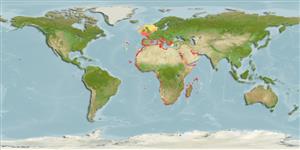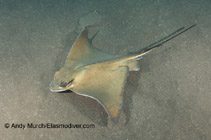Myliobatis aquila (Linnaeus, 1758)
Common eagle ray
Add your observation in Fish Watcher
| Native range | All suitable habitat | Point map | Year 2050 |

|
| This map was computer-generated and has not yet been reviewed. |
| Myliobatis aquila AquaMaps Data sources: GBIF OBIS |
Classification / Names आम नाम | उपशब्द | Catalog of Fishes(वर्ग, प्रजाति) | ITIS | CoL | WoRMS | Cloffa
इलाज़मौबरांकी (शारक और रेज़) (sharks and rays) > Myliobatiformes (Stingrays) > Myliobatidae (Eagle and manta rays)
Etymology: Myliobatis: Greek, mylo = mill + Greek, + Greek, batis,-idos = a ray (Raja sp.) (Ref. 45335).
More on author: Linnaeus.
Etymology: Myliobatis: Greek, mylo = mill + Greek, + Greek, batis,-idos = a ray (Raja sp.) (Ref. 45335).
More on author: Linnaeus.
Environment: milieu / climate zone / depth range / distribution range पारिस्थितिकी
समुद्री; खारा बेनथोपिलाजिक; गहराई सीमा 1 - 300 m (Ref. 4440). Subtropical; 60°N - 36°S, 32°W - 58°E
वितरण देश | ऐफ ऐ ओ क्षेत्र | Ecosystems | संयोग | Point map | भूमिका | Faunafri
Eastern Atlantic: Madeira, Morocco and the Canary Islands north to the western coasts of Ireland and British Isles and the southwestern North Sea, south to Natal, South Africa. Also throughout the Mediterranean.
Length at first maturity / आकार / वज़न / Age
Maturity: Lm ?, range 60 - ? cm
Max length : 183 cm WD पुल्लिंग / अलिंग; (Ref. 4440); अधिकतम प्रकाशित वज़न: 14.5 kg (Ref. 40637)
Max length : 183 cm WD पुल्लिंग / अलिंग; (Ref. 4440); अधिकतम प्रकाशित वज़न: 14.5 kg (Ref. 40637)
Short description पहचान कुंजी | आकृति विज्ञान | मौरफोमैटरिक्स
A plain eagleray with a short, rounded snout; disc with broadly angular corners, and upper or lower jaw usually with 7 rows of plate-like teeth (Ref. 5578). Brown or blackish dorsally, white ventrally (Ref. 5578). No caudal fin (Ref. 5578).
Found in shallow lagoons (Ref. 3965), bays and estuaries; also offshore down to at least 95 m (Ref. 5578). Often found in groups (Ref. 5578). Feeds on benthic crustaceans, mollusks and fish. Ovoviviparous (Ref. 50449). Gestation period of 6-8 months, the females give birth to 3-7 young (Ref. 35388). Caught by shore and ski-boat anglers, usually released after capture (Ref. 5578). Flesh is highly esteemed (Ref. 3965).
Life cycle and mating behavior परिपक्व अवधि | पुनरुत्पत्ति | मछलीऔ का अंडे देना | अंडे | Fecundity | लार्वा
Exhibit ovoviparity (aplacental viviparity), with embryos feeding initially on yolk, then receiving additional nourishment from the mother by indirect absorption of uterine fluid enriched with mucus, fat or protein through specialised structures (Ref. 50449).
Main reference
Upload your references | संदर्भ | संयोजक : McEachran, John | सहयोगीयो
McEachran, J.D. and B. Séret, 1990. Myliobatididae. p. 67-70. In J.C. Quero, J.C. Hureau, C. Karrer, A. Post and L. Saldanha (eds.) Check-list of the fishes of the eastern tropical Atlantic (CLOFETA). JNICT, Lisbon; SEI, Paris; and UNESCO, Paris. Vol. 1. (Ref. 4440)
IUCN Red List Status (Ref. 130435: Version 2024-2)
Critically Endangered (CR) (A2bd); Date assessed: 04 August 2020
CITES
Not Evaluated
Threat to humans
Harmless
Human uses
मात्स्यिकी: लघु वाणिज्य; आखेट मत्स्य: हां
FAO - मात्स्यिकी: landings; Publication: search | FishSource | Sea Around Us
अधिक जानकारी
Population dynamics
Growth parameters
Max. ages / sizes
Length-weight rel.
Length-length rel.
Length-frequencies
Mass conversion
भर्ती
बहुतायत
Growth parameters
Max. ages / sizes
Length-weight rel.
Length-length rel.
Length-frequencies
Mass conversion
भर्ती
बहुतायत
Life cycle
पुनरुत्पत्ति
परिपक्व अवधि
Maturity/Gills rel.
Fecundity
मछलीऔ का अंडे देना
Spawning aggregations
अंडे
Egg development
लार्वा
लारवल गतिकी
पुनरुत्पत्ति
परिपक्व अवधि
Maturity/Gills rel.
Fecundity
मछलीऔ का अंडे देना
Spawning aggregations
अंडे
Egg development
लार्वा
लारवल गतिकी
Anatomy
गिल क्षेत्र
Brain
Otolith
गिल क्षेत्र
Brain
Otolith
Physiology
Body composition
Nutrients
Oxygen consumption
Swimming type
Swimming speed
Visual pigments
Fish sound
Diseases & Parasites
Toxicity (LC50s)
Body composition
Nutrients
Oxygen consumption
Swimming type
Swimming speed
Visual pigments
Fish sound
Diseases & Parasites
Toxicity (LC50s)
Human related
Aquaculture systems
जलीयकृषि रूपरेखाऐ
खींच
Ciguatera cases
Stamps, coins, misc.
Aquaculture systems
जलीयकृषि रूपरेखाऐ
खींच
Ciguatera cases
Stamps, coins, misc.
साधन
Bio-Quiz | E-book | कार्यक्षेत्र पथप्रदर्शक | लंबाई आवृति इंद्रजालिक | जीवन-इतिहास उपकरण | बिन्दु नक्शा | Classification Tree
| Catch-MSY |
Special reports
Download XML
Summary page | Point data | आम नाम | Photos
इंटरनेट स्रोत
AFORO (otoliths) | Aquatic Commons | BHL | Cloffa | BOLDSystems | Websites from users | Check FishWatcher | CISTI | Catalog of Fishes: वर्ग, प्रजाति | DiscoverLife | DORIS | ECOTOX | FAO - मात्स्यिकी: landings; Publication: search | Faunafri | Fishipedia | Fishtrace | GenBank: genome, nucleotide | GloBI | Google Books | Google Scholar | Google | IGFA World Record | MitoFish | राष्ट्रीय आंकड़ासंचय | Otolith Atlas of Taiwan Fishes | सार्वजनिक लजीवालय | PubMed | Reef Life Survey | Socotra Atlas | Tree of Life | Wikipedia: Go, खोज | World Records Freshwater Fishing | Zoological Record
Estimates based on models
Preferred temperature (Ref. 123201): 11.7 - 19.8, mean 15.2 °C (based on 318 cells).
Phylogenetic diversity index (Ref. 82804): PD50 = 0.5002 [Uniqueness, from 0.5 = low to 2.0 = high].
Bayesian length-weight: a=0.00389 (0.00119 - 0.01269), b=3.08 (2.83 - 3.33), in cm total length, based on LWR estimates for this (Sub)family-body shape (Ref. 93245).
Trophic level (Ref. 69278): 3.6 ±0.54 se; based on food items.
लौटाव (Ref. 120179): बहुत नीचे, न्यूनतम जनसंख्या दुगनी समय अवलागत 14 महीने। (Fec=3).
Fishing Vulnerability (Ref. 59153): Very high vulnerability (83 of 100).
Climate Vulnerability (Ref. 125649): Moderate to high vulnerability (47 of 100).
Nutrients (Ref. 124155): Calcium = 6.54 [0.80, 118.48] mg/100g; Iron = 0.508 [0.046, 6.020] mg/100g; Protein = 20.4 [15.1, 25.6] %; Omega3 = 0.205 [0.068, 0.558] g/100g; Selenium = 36.1 [6.7, 193.9] μg/100g; VitaminA = 3.95 [0.36, 41.63] μg/100g; Zinc = 0.492 [0.030, 5.489] mg/100g (wet weight);




